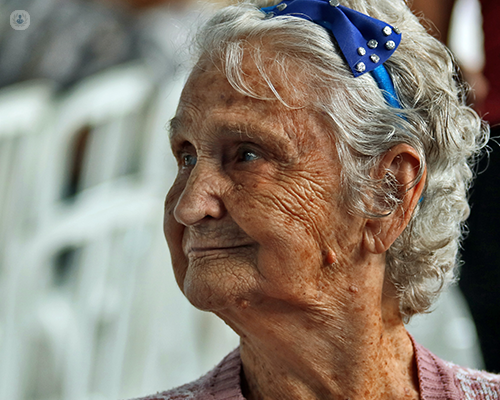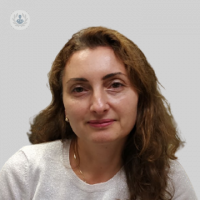Surgery and outcomes for cataracts in patients with age-related macular degeneration
Written by:Cataracts and age-related macular degeneration are two of the most common causes of vision impairment among elderly people worldwide. When combined, they can result in severe vision loss which significantly affects quality of life.
Mrs Kapka Nenova, highly esteemed consultant ophthalmologist, explains what is the difference between the two eye conditions and how they are treated when they occur at the same time.

What is the difference between cataracts and macular degeneration?
Both cataracts and macular degeneration are age related problems. While cataracts affect the lens which is in the front of the eye, age-related macular degeneration affects the retina at the back of the eye. With cataracts, the lens gets cloudy, causing gradual blurring of the vision. Age-related macular degeneration causes permanent damage of the retina and loss of function, leading to rapid loss of central vision that is mainly impaired for reading and close distance.
Do patients commonly suffer from both macular degeneration and cataracts?
Everyone develops cataracts at some stage of their life. On the other hand, only seven to nine per cent of the population worldwide suffers with age-related macular degeneration, but this incidence is increasing. Quite often, patients with age-related macular degeneration also develop cataracts.
How can the two conditions be treated simultaneously?
The treatment for cataracts is a single surgical procedure. This involves the removal of the natural lens and its replacement with an artificial transparent lens, which is calculated for each patient according to their needs. The artificial lens stays in the eye for the rest of the patient’s life.
If the patient needs a course of treatment for age-related macular degeneration, cataract surgery can be performed in the interval between the injections.
Can surgery for cataracts affect the progression of a patient’s macular degeneration?
Surgery for cataracts can upset the retina and trigger the recurrence of age-related macular degeneration if it is stable. Therefore, it is a good idea to perform cataract surgery in the interval between the injections and to keep the patient under close review.
Can surgery for cataracts improve vision in patients with macular degeneration?
The success of cataract surgery and how much vision will improve, cannot be predicted in patients who have age-related macular degeneration, as well. There is better prognosis for those patients with early age-related macular degeneration and a more pessimistic prognosis for those with advanced disease. However, the removal of the cataract, in all cases, provides clearer and brighter vision. This helps patients with everyday activities and their independence, and in general, patients are quite satisfied with the outcome.
If you have recently developed cataracts alongside your age-related macular degeneration and wish to consider your options, don’t hesitate to visit Mrs Nenova’s Top Doctors profile today.



